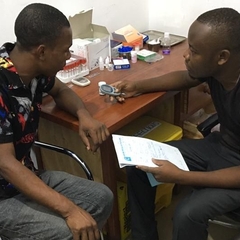
A Type 1 Perspective From Tanzania
15 Sep 2016, 12:32 p.m. in Global Stories by Johnpeter Mwolo
My name is Johnpeter Mwolo and I live in Tanzania. I was diagnosed with type 1 diabetes in June 2005. I do not think life with type 1 will ever be easy here. As a child with type 1 diabetes in Tanzania life is difficult due to lack of availability of personal glucose machines. Other supplies like urine strips are not found in many hospitals. I don’t have the exact statistics but I think apart from national hospitals there are no diabetes specialists. Also the availability if HbA1C kits is a problem. At the national hospital we check only twice per year while in the other hospitals there is either no checking of HbA1C it all or only once per year if you are lucky. In terms of availability of insulin, there are some that are available to us, but the price is too high for others with low income to be able to afford it.
The other big problem faced by people with type 1 diabetes in Tanzania is that many people do not have enough information about diabetes, especially symptoms of diabetes. As a result a lot of people die before diagnosis. For those actually diagnosed with diabetes they often die soon after the diagnosis because parents, especially from rural areas, tend to take their child to witch doctors where they think they can be cured. In Tanzania some people believe that to be diabetic simply means you are cursed and you do not deserve to live. It causes many people not to share anything about diabetes with family members or other people. Also the lack of information causes other kids to be deprived the right to attend school. Families believe that people with diabetes cannot live long so there is no need to waste money on sending someone to school that will die soon.
There are a lot of challenges for people with diabetes in Tanzania. Those I mentioned are just few. We the people with type 1 diabetes want the government, through the Ministry of Health, to provide the necessities to the hospitals so that we can all get better treatment. We also ask for education to make sure people are saved once they start to show initial signs of diabetes. It is very important that people with diabetes are taken to hospital and not to witch doctors, and that the treatment is affordable. The government needs to do a lot more, and I believe more will be done once people are better aware of type 1 diabetes and start acting accordingly.
Right now I am studying at Catholic University of health and allied sciences taking medical laboratory science courses. All I want to do after finish my schooling next year is help spread information about type 1. With the Tanzania Youth Diabetic Alliance and T1International I will make sure a lot of people understand and start to act early when a person shows the signs of diabetes. We need to show people that with the proper care and treatment we can live long lives. We can do anything that others can do, except we should avoid eating sweeties under normal circumstances.
Johnpeter is a T1International Global Advocate.










